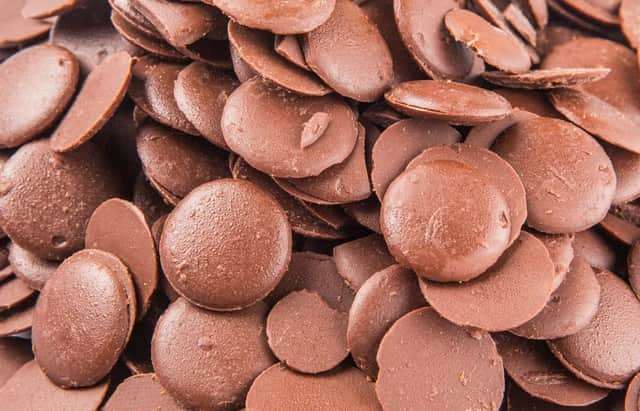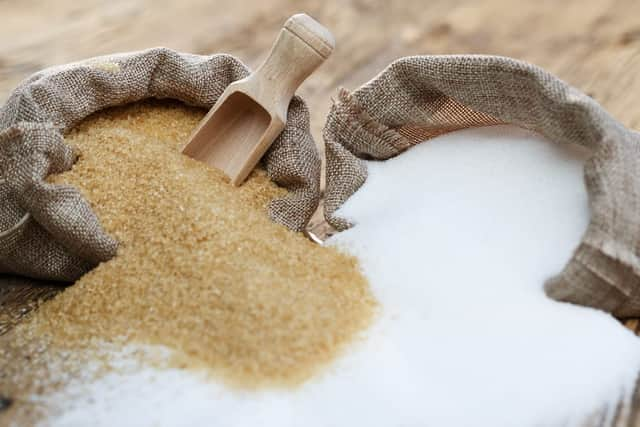Chocolate 'sharing' bags have huge amounts of sugar


Big bags of chocolate buttons and other "sharing" bags can contain up to 29 teaspoons of sugar in a pack... four times an adult's recommended daily intake, a survey shows.
And more than one in three 16 to 24 year olds admit to eating the whole pack themselves - in one go.
Advertisement
Hide AdAdvertisement
Hide AdAction on Sugar is calling for a complete ban on price promotions for the products - with most shops offering discounts.


It also wants a 20 per cent sugar tax imposed on all confectionery.
Worst offender was a £3 198g pack of the US giant Hershey's Brookside Dark Chocolate Pomegranate Flavour that contained the astonishing 29 teaspoons - almost 1,000 calories!
Next in line was its £3 198g Brookside Dark Chocolate Acai & Blueberry Flavours with 28 teaspoons.
Advertisement
Hide AdAdvertisement
Hide AdThis was followed by the £2 170g Marks & Spencer's Gigantic Milk Chocolate Buttons, Lidl's 140g Mister Choc White Chocolate Giant Buttons and a £1.50 133g bags of M&M's Chocolate all with a whopping 23 teaspoons.


The M&S pack suggests there are five portions in it, but even if the pack is shared between five, a single one still contains nearly five teaspoons of sugar - almost the maximum advised daily consumption for a seven to 10 year old.
Asda's 140g pack of Giant White Chocolate Buttons and Morrisons' 135g Giant Milk Chocolate Buttons contain 21 teaspoons each.
Other offenders were 118g of Galaxy Minstrels and 125g Nestle Smarties both with 20, 120g of Cadbury Fudge Minis and 126g Nestle Rolo with 19, 119g Mars Bites and 125g Terry's Chocolate Orange Minis both with 18.
Advertisement
Hide AdAdvertisement
Hide AdThe lowest were 110g Cadbury Picnic Bites with 10, 68g Maltesers Treat bag with 9 and 75g Chocologic Giant Milk Chocolate Buttons and Chocologic Giant Dark Chocolate Buttons packs with four and one teaspoons respectively.
The study by Action on Sugar also found Tesco, Asda, Sainsbury's, Morrisons, Co-op and Waitrose were all offering discounts on sharing bags - from as little as £1 per pack.
This made them comparatively better value for money than smaller pack sizes, said the researchers.
In a new Twitter poll by Action on Sugar more than eight in ten (85%) called for the removal of the price promotions.
Advertisement
Hide AdAdvertisement
Hide AdThis coincides with a survey in The Grocer which revealed more than one in five adults (22.1%) don't share but eat sharing the bags alone - in one go.
This rose to 35.7 per cent for 16 to 24 year olds.
Consumption of confectionery is the second highest contributor to sugar intake in children, after soft drinks.
If price promotions on high sugar products were removed, it is estimated it would cut almost two teaspoons (7g) of sugar on average from every individual's diet per day.
Action on Sugar says despite the strong evidence and public support for such measures, the government has refused to tackle the issue.
Advertisement
Hide AdAdvertisement
Hide AdIt is now calling on Prime Minister Theresa May to immediately revise and strengthen her Childhood Obesity: a Plan for Action.
It has suggested 10 steps to tackle marketing in their own soon-to- be published Action Plan to prevent obesity and type 2 diabetes.
Nutritionist Kawther Hashem, an Action on Sugar researcher based at Queen Mary University of London, said: "Companies and supermarkets are constantly finding ways to push more sugary products - which are contributing to the high rates of obesity, type 2 diabetes and tooth decay in the UK.
"These types of price promotions (i.e. discounts) encourage us to eat far too much sugar and calories and should be banned. It is time retailers are pressed to act responsibly and no longer profit at the expense of our health."
Sugar sharing
Advertisement
Hide AdAdvertisement
Hide AdNutrition information was collected for 95 products that are often packaged for 'sharing' by visiting all major supermarkets between December 17 and January 18.
These included Aldi, Asda, Co-operative, Lidl, Marks & Spencer, Morrisons, Tesco, Sainsbury's and Waitrose.
Action on Sugar defined a 'sharing' bag as a pack of chocolate confectionery between 50 and 200g and with a label to suggest it is intended for 'sharing' or a bag with multiple serving in a single bag not individually wrapped.
Graham MacGregor, professor of cardiovascular medicine at Queen Mary University of London and chairman of Action on Sugar, said: "It is shocking food companies are being allowed to exploit consumers, by manipulating them into purchasing larger size bags of chocolate confectionery on the cheap.
Advertisement
Hide AdAdvertisement
Hide Ad"Prime Minister Theresa May is letting companies get away with this despite pledging to help the socially deprived when she first became the Prime Minister.
"Companies must be held accountable and reminded to reconsider their ethical and corporate responsibility."
An adult's maximum recommended intake of sugar is seven teaspoons (30g), and a seven to 10 year old's six teaspoons (24g).
Jenny Rosborough, campaign manager and registered nutritionist at Action on Sugar, said: "The government published its half-hearted obesity plan in 2016 along with confirmation this was the start of the conversation.
Advertisement
Hide AdAdvertisement
Hide Ad"We now need to see proof the health of our children is the top priority.
"An improved childhood obesity plan must clamp down on promotional and marketing tactics that encourages nothing more than excess sugar and calorie consumption, and we hope they take our suggestions on board."